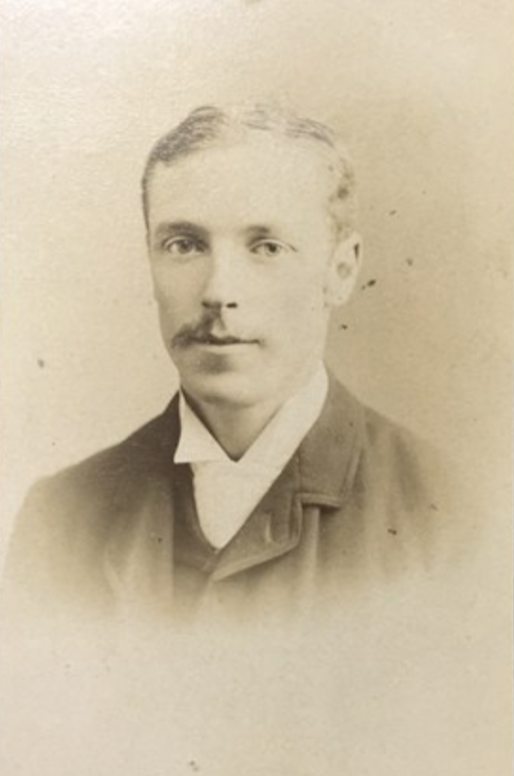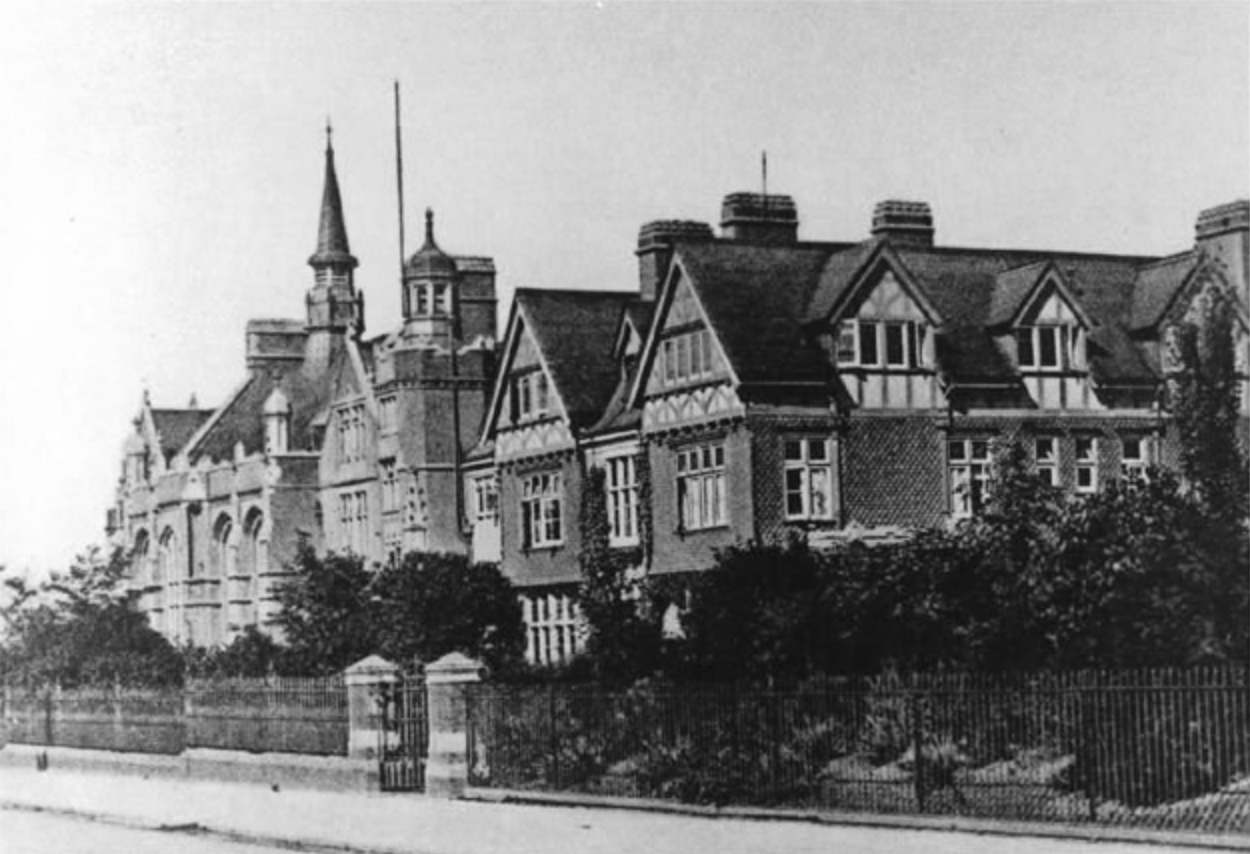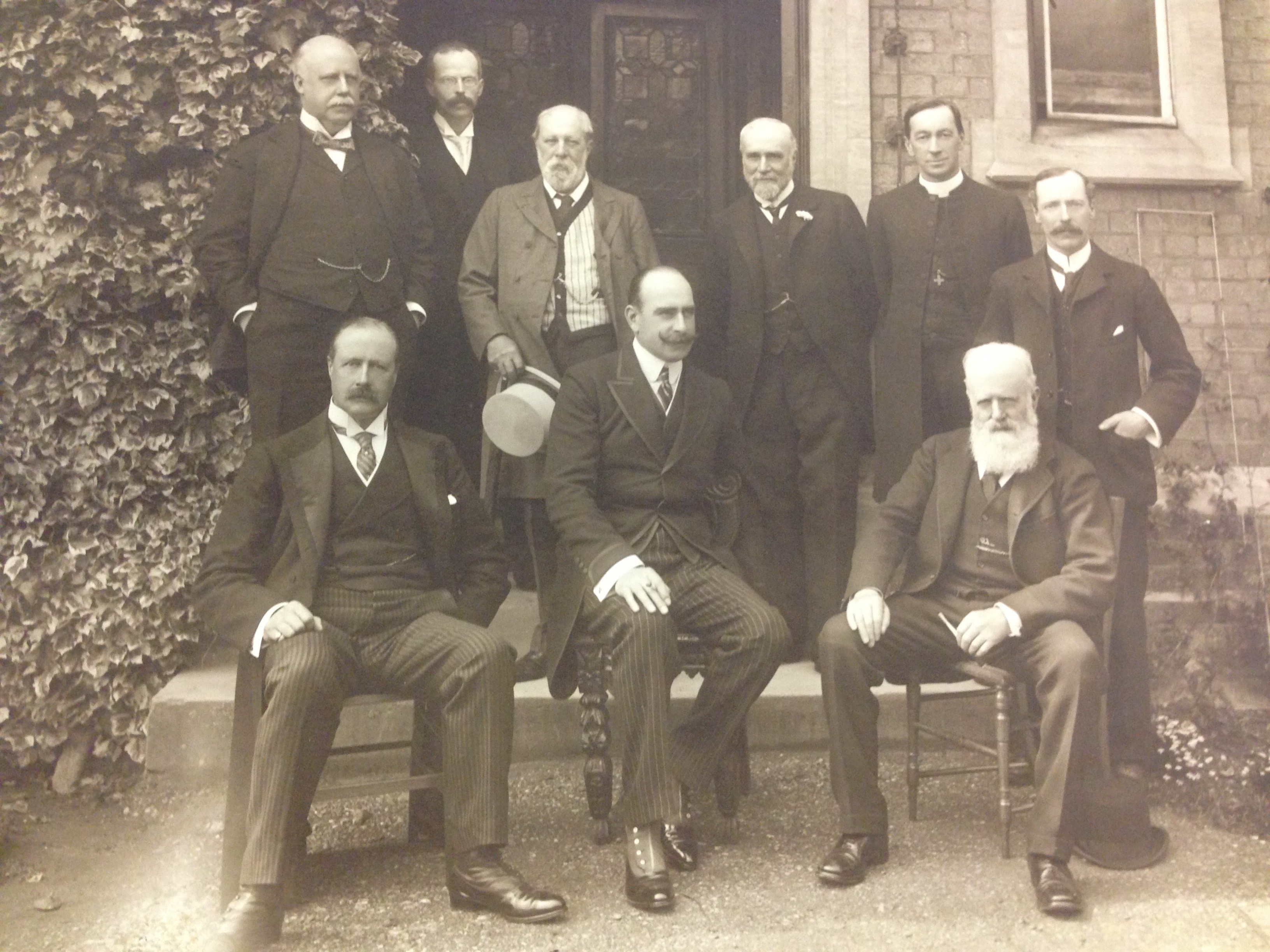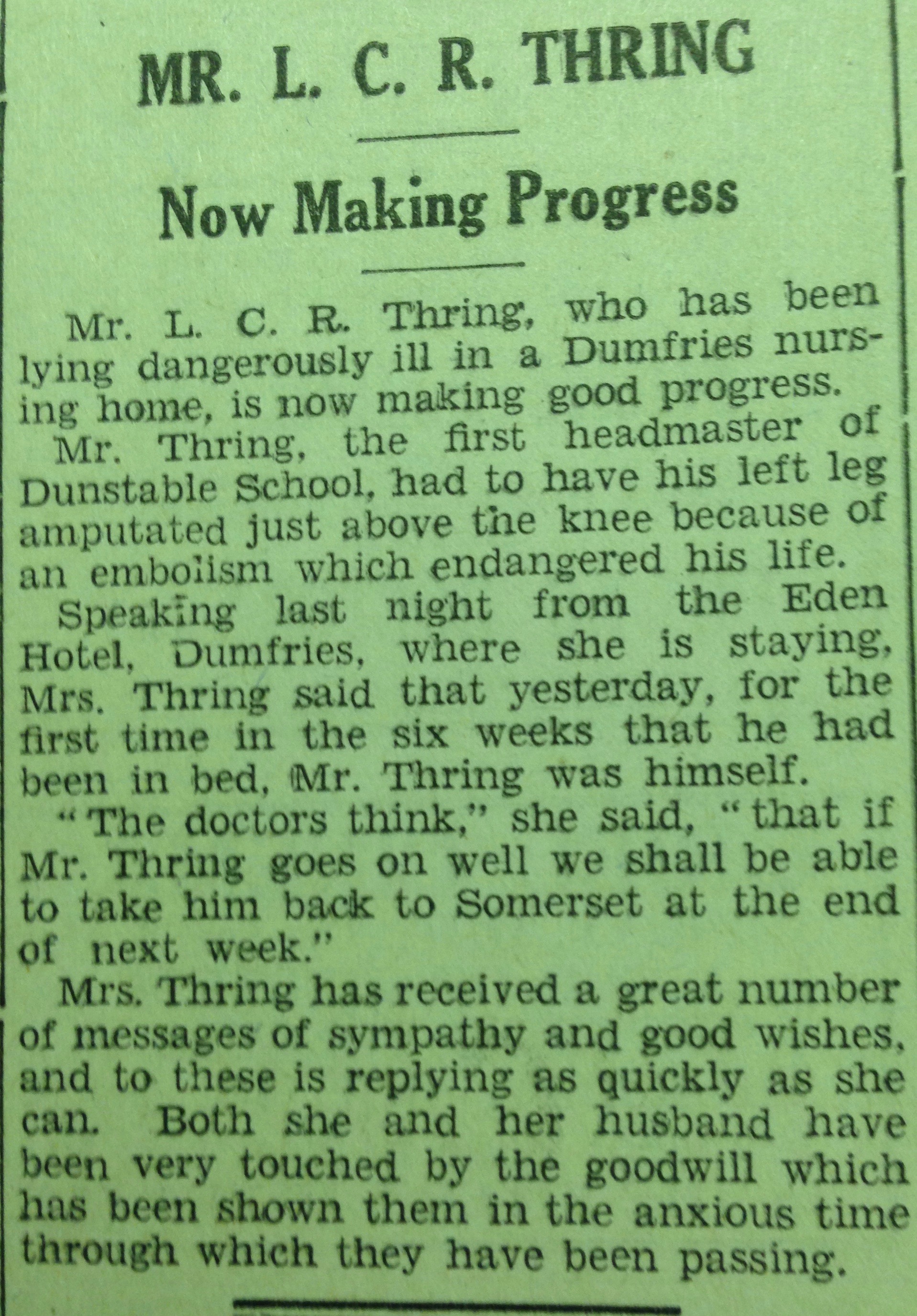Lionel Charles Reginald Thring
Lionel Charles Reginald Thring was born on 5th September 1862 at Uppingham, Rutland. His father was John Charles Thring, a major figure in early football. In 1848, John Charles Thring and his friend Henry de Witton, while studying at King’s College, led the initiative to draw up the Cambridge Rules of Football. Later revisions of those rules were used as a template for the F.A.’s Rules of the Game. It was therefore inevitable that L.C.R. would play football.

L.C.R. attended Uppingham School and Marlborough College. He obtained a degree in Theology at Cambridge University and became assistant master at Wellingborough Grammar School from 1886 until 1888. He played in the successful Wellingborough Grammar School football team that never lost a game against a Luton team. That record was not lost on Luton Town and not long after he moved to Dunstable he was asked to play in the first team. His first game was in October 1888 in the English Cup (F.A.) Cup tie against Reading at Dallow Lane . He scored in the four nil victory. He continued to play for the club until they turned to professionalism in early 1891. L.C.R. continued his association with the club by refereeing many Luton games.
 He married Jessie Margaret Healing on 18th August 1888. They had three children, Elsie (born 1893), Ashton (born 1896 and presumably named after the school) and Marion (born 1899). Ashton died of flu in Ripon in 1917 (see the bottom of the page for more details).
He married Jessie Margaret Healing on 18th August 1888. They had three children, Elsie (born 1893), Ashton (born 1896 and presumably named after the school) and Marion (born 1899). Ashton died of flu in Ripon in 1917 (see the bottom of the page for more details).
In 1888 he became the first Headmaster of the newly built Ashton Grammar School (above), Dunstable, where he remained until retirement in 1921. He was made Secretary of the newly formed Bedfordshire County Cricket Club in 1891.
 L.C.R. is standing on the extreme right in the above photograph. The gentleman seated centre is the Prince of Teck. L.C.R. retired in 1921 after 33 years as headmaster. The Luton News takes up the story below.
L.C.R. is standing on the extreme right in the above photograph. The gentleman seated centre is the Prince of Teck. L.C.R. retired in 1921 after 33 years as headmaster. The Luton News takes up the story below.
FROM THE LUTON NEWS OF 21ST JULY 1921;
“Thirty-three years at Dunstable Grammar School
Too few men are given greater responsibilities than to the heads of our public schools, and to few do their responsibilities bring higher hopes and more bitter disappointments. To such men are entrusted the task of moulding the lives and characters of future leaders of Government and commerce, and the principles inculcated by them must find their reflex in the national life.
Few men are more sensible of the responsibility resting upon them in this connection, than Mr L.C.R. Thring, M.A.. who has for more than 30 years filled the headmaster’s chair at Dunstable Grammar school with so much distinction. When the school closes for the summer vacation on Saturday, Mr Thring will lay aside his cap and gown with his retirement, and there will pass from active educational work one of the most prominent figures in the scholastic life f the county. Mr Thring may said to have been born in the his profession, for coming of a very old Somersetshire family, his father was a master at the famous Uppingham School, where the headmaster was his uncle, the late Mr Edward Thring, one of the greatest headmasters that England ever produced. Mr Thring attended this school under his father and his uncle at the age of nine, and after a subsequent period at Marlborough, he went up to Cambridge at 18, where he took his degree in theology. His first appointment as a teacher was at Wellingborough, where, after four years useful experience, he came to Dunstable as the first headmaster of the Grammar School in 1888.
That institution was not, however, the flourishing and popular local Mecca of education that it has since become. Not a few successful business men in the district can recall the opening day 33 years ago, when the registers contained the names of 46 day boys and three boarders. To-day there are 253 day scholars and 82 boarders The young headmaster, with the example of his distinguished uncle always before him as a guide and an incentive, centred the whole of his abundant energy and talent upon the great work of character building and the evolving of worthy citizens. Methods of teaching have undergone changes in 33 years, and the “Head” has not been reluctant to embrace improvements, but the root principle of the education has never wavered, and it is perhaps significant that during Mr Thring’s last days at school, there is still a place of honour on the wall of his study, a large portrait of the late Mr Edward Thring.
The first few years of uphill work soon bore their fruit, and there were added to the original buildings the laboratories; the big speech hall, two more dormitories, the swimming baths, the gymnasium and Ashton Lodge, where 60 boys and three masters are accommodated. During the holidays, four new class rooms, a cycle house, and appurtenances are to be erected.
It is interesting to glance over the record of what has been accomplished by Mr Thring and his loyal staff during 33 years, by a constant appeal to the highest and best that is in mankind. Here valour and intellect both find a place, and in the list figure names whose fame and worth have spread far beyond their native heath. Lieut. Col. Henderson, who won the V.C. and sacrificed his life at Kut in the late war, was a Dunstable scholar, and there is also Captain Benning R.N. D.S.O. who is now in command of the submarine squadron in the Pacific. Of the old boys who joined up, 206 received commissions, and over 60 laid down their lives. The decorations gained include a D.S.C., 9 M.C’s. 1 D.C.M., 3 M.M’s., 1 Italian Order of St. Maurice and St. Lasarus, 1 Russian Order of St. Vladimar, and 1 of St. George, 3 Croix des Guerre and 1 C.B., the latter being won by Paymaster Commander E.W.C. Thring for intelligence work at the Admiralty. Commander Thring is at present in Germany, where he has been giving evidence in the case concerning the sinking of a hospital ship during the war. On the civil side, there is Mr G.R. Andersen, who came with a free scholarship when the school first opened, and who is now a partner in the publishing house of Harrap. Mr R.J. Gladwell took an open mathematics scholarship for Cambridge, and is now a house master at Clifton. Mr E.V. Watkins also went up to Cambridge with a scholarship, and is now head of a Yorkshire grammar school. Mr P. Haswell, who, with a first in science and a second in mathematics, became senior science master in a large school, was one of four final candidates from whom the selection committee appointed the successor to Mr Thring. To bring the list quite up-to-date, W. Healing has just passed fourth out of Woolwich. In addition, all over the world there are pioneers and engineers working their way steadily up the long ladder of fame, who received their inspiration from Mr Thring. Who would deny him a little pardonable pride in the result of his life’s endeavours. The seed has borne abundant fruit, and the harvest of his efforts has ripened quickly.
An infallible test of the popularity and the worth of a school is the retention of the affection of the students in after years. Dunstable Grammar School passes this test with honours, for there is not only a strong “Old Boys” Club with monthly meetings in London, but a successful local branch with its headquarters at Luton.
Mr Thring is himself the first to admit that the work could never have been accomplished without assistance, and the valuable aid he has received from Mrs Thring is a vital factor which cannot be disassociated from the life of the school. Mrs Thring has been responsible for the domestic arrangements of the boarders, and there are many who cherish affectionate memories of the lady whose kindly aid and sympathy did so much to assuage the sorrow of parting from home. If in Mr Thring the boys found a guide, in Mrs Thring they found a friend.
Mr Thring’s activities have not been confined to the school alone. He never sought municipal honours, but preferred to work unostentatiously. For a long time he was Chairman of the Dunstable Literary and Scientific Society, and until recently was President of the Dunstable Scouts’ Association, while during the war he was Chairman of the Dunstable Military Tribunal. Mr Thring has been for many years a justice of the peace for Dunstable. It is interesting to note that Mr Thring is working with his characteristic energy right up to his last moment in office. This week he will be conducting examinations twelve hours a day. On Saturday he will be entertained by the old boys at their annual cricket match, and speech day takes pace on Monday.
TRIBUTE BY FELLOW JUSTICES
Mr Thring is a Dunstable Justice of the Peace, and his retirement was made the subject of comment at Tuesday’s Borough Sessions. The magistrates present were the Mayor (Ald. W.S. Seamons), Mr A.G. Inwards, Mr LC.R. Thring and Mr F.T. Garrett.
The Mayor said he believed it was the last occasion that the Borough Magistrates would have the pleasure of having Mr Thring as one of their colleagues. It was a matter of great regret to all associated with the police court work in any way, that Mr Thring was leaving, and they all sincerely felt the parting – (hear, Hear). Mr Thring had done his service in Dunstable nobly and well – (hear, hear) – and it was a credit to himself and a credit to the Borough. The Mayor hoped that he would enjoy the retirement which he so well deserved – (hear, hear).
Mr Thring expressed his thanks to the Mayor. He said he felt that he must attend the court that morning as it would be the last of his regular attendances at the police court. He had lived his life in Dunstable, and his interests would always be in the town. Should he be in Dunstable on any occasion the magistrates were sitting he would be glad to occupy his familiar seat. He thanked the magistrates, the Clerk to the magistrates (Mr W. Austin), and the police for the very courteous way in which he had always been received, and the way in which the business of the court had been conducted.”
THE CLIP BELOW IS FROM THE SATURDAY TELEGRAPH OF 13TH OCTOBER 1934
THE CLIP BELOW IS FROM THE LUTON NEWS OF 15TH NOVEMBER 1934
“Passing of Mr L.C.R. Thring
Long Service as Head
Funeral to-day
The funeral took place at Dunstable Cemetery this afternoon of Mr Lionel Charles Reginald Thring, M.A., J.P., formerly headmaster of Dunstable School, who died at his home at The Grange, Ash, Martock, Somerset, on Saturday.
Mr Thring, who was the first headmaster of the school, retiring in 1921 after holding the position for thirty three years was taken ill while shooting on the Scottish moors during the summer. It was necessary for his left leg to be amputated just above the knee, and he remained in a critical condition for some time. He recovered sufficiently to be taken home, but in spite of devoted nursing and care his condition became worse, his heart being unable to stand the shock and strain.
Educated at Uppingham, Marlborough and Cambridge – where he took his degree in theology – Mr Thring’s first scholastic appointment was at Wellingborough School. When Dunstable School was opened in 1888, he became headmaster, and under his guidance the size and scope of the school extended in a remarkable manner.
INTEREST IN PUBLIC WORK
His interest, during his long residence at Dunstable, were by no means confined to his school, and though he never sought municipal honours , he took a close interest in public affairs, and could be relied upon at all times to give support to any project in the interest of the town.
He was a Justice of the Peace for Dunstable, and for a long period was President of the local Scouts’ Association, receiving the “thanks” badge in gratitude for his services. During the war he was Chairman of the Dunstable Military Tribunal.
A thorough sportsman, Mr Thring played both cricket and golf, and it was not long after his appointment at Dunstable that he began to make his mark in county cricket circles. He became captain of the Beds County side, and under his wise and energetic leadership, the county club achieved a gratifying measure of success. he was one of the first members of the Dunstable Golf Club but had played golf on an improvised course on the Downs before the Club was formed.
Mr Thring’s death is greatly regretted by Old Dunstablians all over the world, who will remember him with affection and gratitude, for to all he was a real friend, as well as the “Head.” Early this year he and Mrs Thring were guests of honour at the Old Dunstablians Club dinner, and many warm tributes were paid to his ability and worth and all that he had done for the school.
Mr Thring is survived by his wife and two daughters. His only son died during the war while serving with the North Midland R.F.A.”
Thanks to;
The Luton News
For details of Ashton’s funeral see http://www.worldwar1luton.com/event/funeral-lieutenant-thring . This is a Luton Culture website devoted to World War One.




